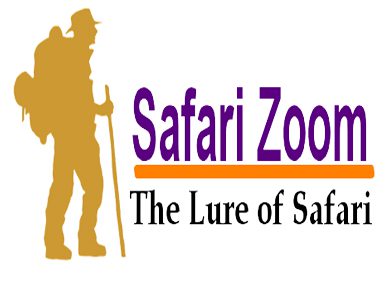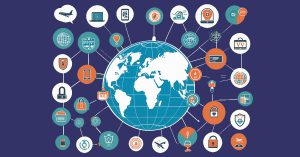AI Certifications: The Best Programs for Travel, Tourism and Hospitality
AI in Tourism and Hospitality
The tourism and hospitality industry has always been about people—welcoming guests, creating memorable experiences, and delivering services that feel personal and meaningful. But in today’s digital-first world, Artificial Intelligence (AI) is becoming the invisible hand behind many of those seamless guest experiences. AI is shaping the future of travel like never before, from the chatbot that answers your booking queries at 2 a.m., the recommendation system that suggests personalized travel itineraries, or the smart hotel rooms adjusting lighting and temperature based on guest preferences.
Why does this matter to you if you’re in the tourism sector? Simply put: AI is not a trend—it’s the new standard. Travelers today expect faster responses, personalized recommendations, and hassle-free bookings. Hotels, airlines, and travel agencies that fail to adapt risk being left behind. That’s where AI certifications come in. For tourism professionals, learning how AI tools work, and more importantly, how to apply them in real-world travel scenarios, can mean the difference between staying relevant and becoming outdated.
Consider this: a hotel manager with an AI-powered analytics certification can forecast seasonal demand more accurately, a travel consultant trained in machine learning can design dynamic pricing strategies, and a digital marketer in tourism with a Google AI credential can run smarter campaigns that drive higher bookings. These are not futuristic possibilities—they are today’s realities.
Getting certified in AI is like learning a new language, but instead of French or Spanish, it’s the language of data, automation, and digital personalization. For professionals in travel and hospitality, this skillset translates directly into career growth, higher salaries, and more opportunities to innovate.
This guide focus on the best AI certifications from platforms like Google, Coursera, IBM, AWS, and others—all tailored to help tourism professionals thrive. Whether you’re a hotel manager, a travel agency owner, a tour operator, or a student dreaming of working in luxury resorts, there’s a program here designed to elevate your skills.
Understanding the Role of AI in Travel and Hospitality
If you think AI is only for tech giants, think again. In fact, AI is everywhere in tourism and hospitality—you just may not notice it. Behind every smooth travel experience lies some form of intelligent system working quietly in the background. Let’s break down where AI fits in this fast-evolving industry:
AI-Powered Customer Service (Chatbots & Virtual Assistants)
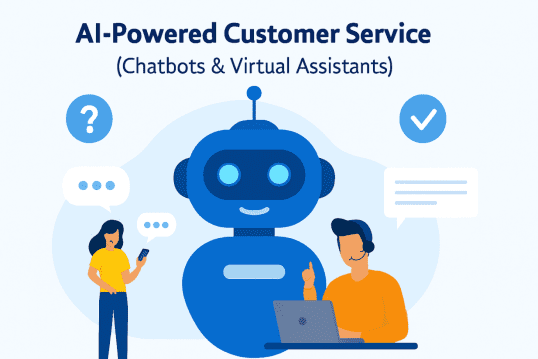
Ever tried chatting with a hotel’s “agent” online, only to realize it’s not a human but an AI bot? That’s AI in action. These chatbots handle 24/7 customer inquiries, automate bookings, and even upsell room upgrades or travel packages. In tourism, where guests come from different time zones and demand immediate responses, AI ensures no query is left unanswered. Virtual assistants also help in-flight services, tour guiding, and even concierge tasks.
Predictive Analytics for Tourism Trends
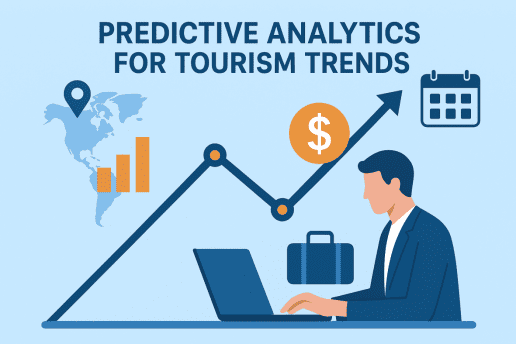
One of AI’s strongest suits is prediction. Airlines use it to forecast passenger loads, hotels use it to anticipate occupancy rates, and travel companies rely on it to track seasonal demand. By analyzing past data, AI predicts future trends—like when flights will be most expensive or which destinations will become hot travel spots next year. This allows businesses to make smarter, data-driven decisions.
Personalization in Guest Experiences
Tourism thrives on personalization. Imagine receiving a vacation package tailored not just to your budget but to your personality—adventure trips for thrill-seekers, luxury stays for relaxation lovers, or culinary tours for foodies. AI analyzes user preferences, online behavior, and past bookings to create hyper-personalized experiences. For hotels, this could mean suggesting spa treatments to frequent wellness travelers or organizing city tours for culture enthusiasts.
Smart Hotels and AI-Driven Operations
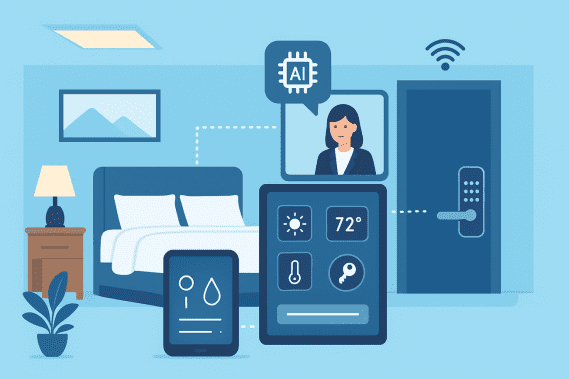
The rise of smart hotels is a game-changer. From AI-powered check-ins to voice-controlled room settings, automation is transforming guest stays. Hotels use AI to optimize housekeeping schedules, reduce energy consumption, and improve security. For example, AI sensors can detect when guests leave a room and automatically adjust lights and air conditioning, reducing costs while being eco-friendly.
In short, AI in travel and hospitality is about efficiency, personalization, and better decision-making. Understanding these applications is crucial before choosing the right certification, because it allows you to focus on the areas most relevant to your role or business.
Benefits of Pursuing AI Certifications for Tourism Professionals
You might be wondering, “Do I really need a certification, or can I just learn AI concepts online for free?” While casual learning is useful, a recognized certification gives you credibility, structured knowledge, and a career advantage in an industry that’s becoming increasingly competitive. Let’s explore the top benefits:
Career Advancement and Higher Employability
Hospitality and tourism are industries where skills can make or break your career. With an AI certification, you demonstrate not just technical knowledge but also the ability to apply AI tools in real business scenarios. Employers hiring for hotel management, travel consultancy, or digital tourism marketing look for candidates who can leverage data-driven insights. Having “Google Cloud AI Certified” or “IBM Applied AI Professional” on your CV instantly sets you apart.
Increased Efficiency in Hotel and Travel Operations
AI certifications don’t just benefit employees—they benefit organizations. Trained professionals can implement AI solutions that save time and cut costs. For example, a hotel with an AI-trained operations manager can reduce staff workload by automating check-ins, while a travel agency can streamline customer support with AI bots, allowing human staff to focus on high-value tasks.
Gaining a Competitive Edge in a Digital Market
Tourism businesses compete fiercely, especially online. Imagine two travel agencies—one uses traditional methods while the other applies AI for dynamic pricing, targeted ads, and customer service automation. Which one do you think travelers will choose? AI-certified professionals are equipped with the tools to help their organizations outperform competitors.
Opportunities for Entrepreneurs in Tourism Tech
AI isn’t just for employees—it’s also for entrepreneurs. Many startups in tourism today are AI-driven platforms offering unique services like AI-curated tours, AI-powered translation for travelers, and AI-based travel insurance models. By acquiring certifications, entrepreneurs gain the skills to innovate and build scalable solutions for the industry.
In essence, an AI certification is not just a credential—it’s a ticket to future-proofing your career or business in tourism.
Top AI Certifications for Travel, Tourism, and Hospitality Professionals
Here’s where things get exciting. With so many platforms offering AI certifications, which ones should a tourism professional choose? The good news is that many top AI programs are already industry-relevant and can be applied directly to travel and hospitality. Let’s look at the most valuable options:
Google AI and Machine Learning Courses
Google Cloud offers some of the most recognized certifications in AI. For tourism, Google’s AI and ML programs help professionals analyze customer behavior, improve marketing strategies, and automate hotel operations. They also include TensorFlow developer training, which is widely used in personalization models.
Coursera Specializations Relevant to Tourism
Coursera partners with top universities and tech companies to offer AI for Business, AI in Marketing, and Data Science programs. These are perfect for hospitality managers, tourism marketers, and entrepreneurs who want structured, industry-ready learning paths.
IBM Applied AI Professional Certificate
IBM is a pioneer in AI education, and their Applied AI Professional Certificate is practical, project-based, and highly relevant to industries like hospitality. It covers AI concepts, chatbot creation, and even AI APIs—all applicable in guest services and travel businesses.
AWS AI and Machine Learning Programs
Amazon Web Services (AWS) powers many digital platforms, including those in tourism. Their AI and ML certification programs are valuable for building AI-driven applications for travel portals, hotel booking systems, and predictive demand models.
edX and Harvard AI in Business Applications
For those looking for academic rigor, edX and Harvard offer AI in Business courses that explore how AI applies to industries like tourism, luxury services, and customer-centric businesses. These certifications are especially attractive for executives in the hospitality sector.
Udemy AI for Business and Tourism Applications
Udemy provides flexible, affordable courses that focus on practical AI applications in tourism and business. These certifications are ideal for small business owners or freelancers who want to adopt AI quickly without long academic commitments.
Best Google AI Certifications for Tourism Professionals
Among all providers, Google stands out as a leader in AI training, offering certifications that directly benefit travel and hospitality professionals. Here are the top options:
Google Cloud AI and Machine Learning Certification
This certification teaches professionals to design, build, and deploy AI solutions on Google Cloud. For tourism businesses, this can be applied in predictive analytics for booking trends, AI chatbots for hotel services, and customer experience automation.
TensorFlow Developer Certificate
TensorFlow is Google’s open-source library for machine learning, widely used in personalization engines. A certified TensorFlow developer can build recommendation systems for travel itineraries, hotel upgrades, and personalized guest experiences.
Google Analytics and AI for Tourism Marketing
Google Analytics now integrates AI tools that predict customer behavior, analyze traveler preferences, and optimize digital campaigns. Certification in this area helps tourism marketers design smarter ad strategies that maximize return on investment.
Real-World Applications for Hotels and Travel Agencies
Tourism professionals trained in Google AI certifications can apply their knowledge in practical ways:
In short, Google AI certifications are a must-have for anyone serious about integrating technology into tourism.
Coursera AI Specializations for Travel and Hospitality
When it comes to flexible, high-quality online education, Coursera is often the first stop for professionals looking to upgrade their skills. The platform partners with world-renowned universities and tech companies, making its certifications highly valuable and widely recognized in the job market. For tourism and hospitality professionals, Coursera offers several AI-focused programs tailored to business, customer service, and marketing applications—all areas that directly impact the travel industry.
This is one of Coursera’s most popular AI courses, designed to make AI accessible even to non-technical professionals. Tourism managers, hotel executives, and tour operators can take this course to understand the strategic applications of AI without diving deep into coding. It helps you grasp how AI can improve guest experiences, automate bookings, and optimize hotel operations.
AI in Marketing Specializations
Marketing drives much of the tourism business, and Coursera offers specializations that focus on AI-driven digital marketing. These courses teach how AI can analyze customer data, forecast demand, personalize advertisements, and improve ROI on campaigns. A travel agency, for example, can learn to use AI to target adventure travelers with personalized tour packages or luxury travelers with premium hotel deals.
Data Science and AI Specializations
For professionals who want a deeper dive into technical skills, Coursera’s Data Science and AI programs (offered by universities like Stanford, Michigan, and Imperial College London) are ideal. These programs cover machine learning, predictive analytics, and natural language processing—skills that can be applied to forecasting travel demand, creating chatbots for guest support, and building recommendation systems.
Hospitality and Tourism-Specific Applications
While Coursera’s courses are not labeled “tourism only,” their business-focused AI content translates directly to the industry. For example:
In short, Coursera provides a structured yet flexible way for tourism professionals to gain AI expertise without leaving their jobs. Its certifications are recognized globally, making them a strong investment for career growth.
IBM Applied AI Professional Certificate
IBM has been a pioneer in the AI field for decades, and its Applied AI Professional Certificate on Coursera is one of the most practical certifications available today. Unlike some academic programs, this one is designed to equip learners with hands-on AI skills that can be applied immediately in industries like travel and hospitality.
Course Structure and Content
The program covers a broad spectrum of AI fundamentals, including:
What sets this certification apart is its project-based learning. Participants don’t just learn theory—they actually build working AI applications. For instance, a project might involve creating a chatbot that helps customers book flights or a sentiment analysis tool that interprets guest feedback.
Applications in Tourism and Hospitality
Tourism professionals can directly apply IBM’s AI training in several areas:
IBM’s credibility in AI and cloud technologies means that this certification carries strong industry weight. Employers in tourism and hospitality recognize IBM as a trusted leader, which gives certificate holders a significant edge in the job market.
AWS AI and Machine Learning Programs
Amazon Web Services (AWS) is the backbone of many digital platforms across industries, including travel portals, hotel booking systems, and airline websites. Their AI and Machine Learning certifications are designed for professionals who want to build, deploy, and scale AI applications—a skill set that is increasingly valuable in the hospitality sector.
AWS Machine Learning Specialty Certification
This advanced-level certification validates expertise in building, training, and deploying machine learning models on AWS. For a travel professional, this means being able to design systems that can:
AWS AI Services and Tools
AWS offers a variety of AI services that are useful in tourism, including:
Why AWS Matters in Tourism
Many large travel companies already use AWS for cloud services. By becoming AWS-certified, professionals gain the skills to leverage existing infrastructure more effectively. For example, a resort chain using AWS could implement AI-driven forecasting to optimize staffing during peak tourist seasons, or a tour operator could integrate AI-powered voice assistants to handle customer queries in multiple languages.
In short, AWS certifications are perfect for tourism professionals who want to move beyond theory and develop real-world AI solutions for the industry.
edX and Harvard AI in Business Applications
For those who prefer a more academic approach, edX—a platform created by Harvard and MIT—offers high-quality AI programs from leading universities. Many of these certifications focus on AI in business strategy, leadership, and customer experience, making them particularly relevant to executives and managers in tourism and hospitality.
Harvard’s AI for Business Certification
This program explores how AI is transforming business models and decision-making. Tourism professionals can learn how to:
MIT’s AI: Implications for Business Strategy
Another highly respected option, this course focuses on how organizations can leverage AI for competitive advantage. For hospitality leaders, this means understanding how AI investments can improve customer loyalty, operational efficiency, and marketing ROI.
Relevance to Tourism and Hospitality
While not tourism-specific, these certifications provide executive-level insights that are invaluable for hotel managers, tourism board officials, and travel entrepreneurs. The programs focus on strategic application rather than coding, making them ideal for professionals who oversee operations but may not be directly involved in technical implementation.
Udemy AI for Business and Tourism Applications
Not everyone has the time or budget for long-term certifications from big-name institutions. That’s where Udemy shines. It offers affordable, short-term AI courses that focus on practical applications for business, many of which are directly applicable to the tourism and hospitality sector.
AI for Business Courses
Udemy’s catalog includes numerous AI programs tailored to business users, such as:
These are especially useful for small travel agencies, boutique hotels, or solo tour operators who want to integrate AI quickly without large investments.
Tourism-Specific AI Applications
Some Udemy instructors specialize in applying AI concepts to tourism. For example:
Flexibility and Accessibility
Udemy courses are self-paced, affordable, and often updated with the latest tools. This makes them a great choice for professionals in the tourism industry who may not have the time for lengthy academic commitments but still want hands-on skills in AI.
How to Choose the Right AI Certification for Tourism Professionals
With so many AI certifications available, it’s easy to feel overwhelmed. The key is to pick a program that aligns with your role, career goals, and the needs of the tourism industry. Not every professional needs deep coding knowledge—sometimes a business-focused AI certification is far more valuable.
Step 1: Identify Your Career Goals
Step 2: Assess the Technical Depth Required
If you’re in a strategic or managerial role, you don’t need to dive into TensorFlow coding right away. Instead, opt for business-oriented AI certifications. On the other hand, if you want to build AI-powered tools or apps, certifications like Google TensorFlow or AWS Machine Learning are more suitable.
Step 3: Consider Time and Cost
Step 4: Look for Real-World Applications in Tourism
Not all certifications emphasize tourism-specific use cases. Choose a program that teaches customer analytics, personalization, predictive demand modeling, or AI in marketing—all of which directly apply to travel and hospitality.
By following these steps, you’ll avoid wasting time on irrelevant certifications and instead focus on programs that add direct value to your tourism career.
Case Studies: AI in Action in Tourism and Hospitality
To really understand the impact of AI certifications, let’s look at some real-world examples of how AI is transforming the industry.
Case Study 1: Marriott International and AI-Powered Personalization
Marriott uses AI-driven analytics to predict guest preferences and create personalized offers. Certified AI professionals in their team help design models that analyze loyalty program data, browsing behavior, and booking history. This results in tailored promotions, like spa discounts for wellness travelers or dining packages for food enthusiasts.
Case Study 2: Expedia and Predictive Analytics
Expedia relies on AI models to predict seasonal travel trends and optimize pricing. Professionals trained in AWS machine learning tools contribute to designing algorithms that help customers find the best travel deals while maximizing company revenue.
Case Study 3: Hilton Hotels and Chatbot Assistants
Hilton introduced “Connie,” an AI-powered concierge that helps guests with FAQs about hotel services and local attractions. Building such systems requires professionals skilled in IBM Watson Assistant and NLP tools, highlighting the direct application of certifications.
Case Study 4: Airbnb and Dynamic Pricing
Airbnb uses AI to dynamically adjust rental prices based on demand, location, and traveler behavior. Certifications in Google Cloud AI and predictive analytics help professionals contribute to these pricing models.
These examples show that AI certifications are not just academic exercises—they translate directly into industry innovation.
Future of AI in Tourism and Hospitality
The integration of AI in tourism is still in its early stages, but the future is incredibly promising. By 2030, AI is expected to revolutionize the way we plan, book, and experience travel.
AI-Driven Personalized Travel Agents
Imagine a fully AI-powered virtual assistant that plans your trip end-to-end: booking flights, suggesting hotels, designing itineraries, and even adjusting plans based on real-time weather or traffic. Certifications in AI-powered customer experience design will be essential for professionals in this space.
Robotics in Hotels and Airports
AI-powered robots are already assisting with check-ins, baggage handling, and even room service. Professionals with IBM Applied AI or AWS AI certifications will be at the forefront of designing these systems.
AI for Sustainable Tourism
As travelers demand eco-friendly options, AI will help businesses reduce waste, optimize energy consumption, and promote sustainable tourism. Certifications in AI for Business Strategy will equip professionals to apply these solutions effectively.
Multi-Language AI Assistants
AI-driven translation tools will make global travel easier by breaking down language barriers between tourists and service providers. Tourism professionals certified in NLP and AI communication tools will have a massive advantage.
In short, the future belongs to professionals who can combine hospitality expertise with AI knowledge. Those who invest in certifications now will lead the next wave of transformation in tourism.
Tips to Maximize the Value of Your AI Certification
Getting a certification is just the beginning. To truly benefit, you need to apply what you learn in real-world scenarios. Here’s how:
By taking these steps, your AI certification becomes more than a credential—it becomes a career-transforming skillset.
Final words
The travel, tourism, and hospitality industry is entering an era where AI is no longer optional—it’s essential. From personalized guest experiences to predictive analytics and smart hotel operations, AI is shaping the way businesses operate and how travelers explore the world.
By pursuing AI certifications from Google, Coursera, IBM, AWS, edX, and Udemy, professionals in the tourism sector can gain the skills needed to stay ahead of the curve. Whether you’re a hotel manager aiming to enhance guest experiences, a travel marketer seeking better insights, or an entrepreneur looking to innovate, there’s a certification that fits your journey.
Investing in AI education today means securing your role in the future of tourism tomorrow.
FAQs
Q1: Which AI certification is best for hotel managers?
Hotel managers should focus on AI in Business and Customer Experience certifications from Coursera or edX, as these emphasize personalization, analytics, and guest satisfaction strategies.
Q2: Are AI certifications worth it for travel agents?
Yes! AI certifications help travel agents use predictive analytics and chatbots to automate bookings and personalize travel recommendations, boosting customer loyalty.
Q3: Do I need coding knowledge for AI certifications in tourism?
Not always. Many certifications, like AI for Everyone (Coursera) or Harvard’s AI for Business, focus on applications rather than coding, making them perfect for non-technical professionals.
Q4: How can AI certifications help in tourism marketing?
AI certifications enable marketers to leverage predictive analytics, targeted advertising, and AI-driven SEO strategies, ensuring campaigns reach the right travelers at the right time.
Q5: Which is the most affordable option for AI certifications?
For budget-conscious learners, Udemy offers affordable AI courses tailored to business and tourism applications, making it a great starting point.
